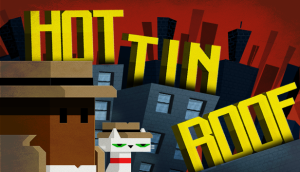
Glass Bottom Games‘s noir, mystery-solving metroidvania Hot Tin Roof: The Cat That Wore A Fedora is queer. Maybe it’s better to say that it queers: it takes the normative and twists it in the direction of the feminine, the feminist, the genderfluid, and the non-hetero. It’s a joyful celebration of subversion.
Continue reading Hot Tin Roof Is Queer
Tag Archives: gender
No More No More Heroes
I can finally remove No More Heroes from the “Games I’m Playing” section of the sidebar and onto the “Games I’ve Played” page. I finished the game tonight. It’s strange, to say the least. It’s an insanely bloody Wii beat-em-up game that just screams for attention. It’s loaded with self-reference, style, and unsubtlety, and I’m still processing a lot of it.
The gameplay is very odd. I realized during the final boss fight that it is as if the developers really liked the swordplay and treasure seeking of The Legend of Zelda: Wind Waker and decided to make a whole game about it. The swordplay has the same rhythmic feel as the GameCube Zelda, and even has a prominent timed dodge mechanic that lets you break past the defenses of vulnerable enemies. Even the way that the enemies’ corpses explode is similar. At the same time, the repetitive “do jobs while driving around an empty city searching for buried coins” sections call back to Wind Waker‘s late-game “try to find tiny treasure chests in a big, boring ocean” activity. The fighting portions are a whole lot of fun, except when the developers make the puzzling decision to subvert the character’s abilities. One late-game boss is immune to the protagonist’s very-useful wrestling moves, and other bosses regularly demand an entirely different approach than the rest of the sword fights.
And the story… it’s tough. The game is simultaneously a celebration and a condemnation of geeky, oversexed, otaku, socially awkward gamer culture. The main character, Travis Touchdown, is almost entirely unlikable; his only redeeming trait is that he is entirely honest about his goals: to be number one and to get laid. Other characters philosophize, or seek money and fame and power. Travis states, again and again, that he isn’t interested in all that. He just wants to be the best.
Sex and gender are strong motifs in the game. It bounces between wry postfeminism, with Sylvia using her body to manipulate Travis, and simple self-aware chauvinism, with Travis’s constant search for sex and his special treatment of female bosses. The phallic imagery is in-your-face the whole game: enormous swords, a bulbous motorcycle, and the need to jack off your Wiimote to “recharge your energy.” Travis takes a dump to save, has a homoerotic relationship with his sword trainer, and has a rather intense love of professional wrestling. Just about every character in the game is defined by sex and gender, from the estranged father to the effeminate pelvis-thrusting superhero fetishist to the sadistic loligoth with projectile men in gimp suits.
The whole thing really hasn’t fit together in my head yet, though. By the end of the game, it’s deconstructing itself, with characters offering ludicrous twists and explanations and openly referring to Travis as the protagonist. It’s just so silly and disjointed that I’m not really sure it has anything interesting to say. The well-read game hobbyist is familiar with the idea that gamers and game developers are “stunted adolescents.” The gameplay is fun but flawed, and doesn’t have much to do with the motifs and concepts thrown haphazardly around. I’ll think about it some more, and if I come up with any sort of synthesis from the game, I’ll post again.